Peter MALONE
Saturday, 18 September 2021 19:56
Marshland
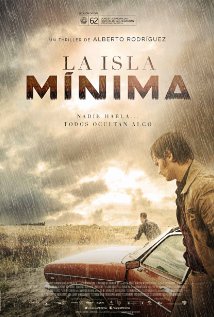
MARSHLAND
Spain, 2014, 105 minutes, Colour.
Javier Gutierrez, Raul Arevalo.
Directed by Alberto Rodríguez.
Marshland was the winner of several awards, especially in Spain, its country of origin.
Audiences always enjoy a solid detective investigation as well is an interesting murder mystery. Marshland provides these – and, with its setting in Andalucia and the marsh country, many audiences who appreciated the television series, True Detective, make some links.
The setting is very important, the strange marshlands and the people who live and work there, something of an isolated community. The time setting is also very important. It is 1980, four years after the end of the Franco regime which dominated Spain for four decades, the period of repression under fascist government. At this stage, the people are not used to the new freedoms and the film makes explicit allusions to police activity in the past, putting down protests, shooting people, torturing them and the cover-ups. It emerges that one of the detective sent to solve the current mystery had been a vigorous police torturer, something he denies, but proof is given that the accusation is true.
The film opens with overhead shots of the marshlands, looking like artificial diagrams, but with the camera slowly descending to the waterways, the fields, the intersections. And, on one of the roads, the detectives experiencing a car breakdown, and taken into the town.
The murder mystery concerns two teenage girls who disappeared, but their bodies, violated and mutilated, are soon found. It soon emerges that other girls have disappeared, parents upset and distraught.
The film shows the two detectives, quite different in personality, the older one more assured with a touch of humour and enjoying life, the other one in his 30s, much more serious, concerned about possible promotion to Madrid and phoning his pregnant wife.
Parents are interviewed. Other school students are also interviewed. Various characters in the town come under suspicion, and detection leads to a hunting lodge and an abandoned hut on the property. Some negatives of photos are found, indicating sexual behaviour. Brochures are also found from a company which is soliciting responses from young girls for better jobs in the city.
One of the characters in the town is a writer, imagining that he might become a Truman Capote, writing a ‘real life’ book about the crimes and investigations. He is particularly helpful in collaborating with the police, developing photos, giving information about the town.
The film is in delineating the characters of the two men, their capacity for working together, the differences in their temperaments. The local authorities want the crimes solved. Some of the people in the town become more suspicious as the investigation goes on, including a dangerous car pursuit at the night on the marshes.
Ultimately, the further victim is rescued, the mystery solved, the police are acclaimed and become famous in the newspapers.
But, along with the detection and the solved mystery, the film is most interesting in its re-creation of the place, the period, the people and the aftermath of the Franco regime.
1. A true story? Winner of many awards?
2. The time, the initial visuals during the credits, the design of the marshes? The tone, views, homes and the visuals of the countryside? Musical score?
3. 1980, Spanish society, Andalusia? The Franco era, society adjusting or not? The role of the police, the flashbacks of protest, shootings and torture? The officials after the political changes? The spirit of fascism?
4. The two detectives, the car breakdown, coming from Madrid, the commission to solve the case, the possibility for promotions? The skills? Personalities, Juan, jovial, his methods? Pedro, in his 30s, serious, the pregnant wife and phone calls?
5. The situation of the sisters, their age, appearance, upset, the interviews with the parents, the discussions with the school friends? The girls as wild, sex, the stories and speculation? The bodies found, the girls’ injuries? Violence, violation, cuts? The local police and inefficiency? The finding of the negative, and indications of sexual behaviour?
6. The parents, the harsh father, the wife giving more information?
7. Quini, his being with the girls, drawing the knife, questions, answers, his connections, reputation in the town, hostility, the investigations, the link to therich man, the man who had disappeared, exposure?
8. The local authority, his pressure on the detectives? Later, cover-up?
9. The journalist, wanting to write the story of the crime? His personality, information and help, developing the photos? His comments about Juan and his police brutality, Juan denying it, the photos and the truth?
10. The mansion, the owner, escape, the confrontation stories?
11. Marina, friendship, people’s concern, her being taken, in the boot of the car? The rescue?
12. Information about the job applications, the pamphlets, the way they we used, the stories of the other girls, the disappearance, anguish of the parents?
13. The two detectives, their work together, separately, the methods, getting information, collaboration?
14. The night, the pursuit, the marshes?
15. The contribution of the local police?
16. Making connections, the owner of the mansion, the perfume, the missing man and the story about him, leaving? The sex trade and abuse?
17. The aftermath, acclaim in the papers, Juan and the girls and the, Pedro and his promotion, talking with his wife, Madrid, and the truth about Juan?
18. The probing of the ethos of a small town, in the post-Franco era, its ethos?
Published in Movie Reviews
Published in
Movie Reviews
Tagged under
Saturday, 18 September 2021 19:56
Standing Up
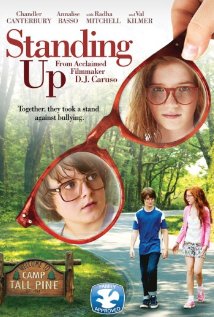
STANDING UP
US, 2013, 100 minutes, Colour.
Chandler Canterbury, Annelise Basso, Radha Mitchell, Val Kilmer.
Directed by D.J.Caruso.
D.J.Caruso has tended to be a director of thrillers including The Salton Sea, Taking Lives, Disturbia. However, he has professed liking for the young adult novel, The Goats, by Brock Cole. He has adapted it for the screen and directed the film.
The Goats are two young children who are picked on by boys and girls at a summer camp, their clothes taken, their being left on the island of goats. Instead of giving up, the young boy, Howie, Chandler Canterbury, small and bespectacled, decides to take initiatives for himself and for the young girl, Grace, and Annelise Basso. She is unwilling at first, very timid, phones her mother who urges her to be tough. The couple go through quite a number of adventures, eluding the children in the camp as well as the authorities. They use initiative in going into houses, finding clothes, something to eat, including Grace being courageous enough to divert a hostile kiosk seller while Howie steals some clothes for them. They also spend a night in a motel, shrewdly getting the key of a room from a departing family and telling the managers that the family was staying another day.
They also take refuge with children from another camp, where they are welcomed, expect for the young boy who makes advances on Grace but is tripped by Howie – who, though he was in tears and ashamed, is invited by Howie to join in a group photo with the others who are kind.
There are also picked up by suspicious man, Val Kilmer, who turns out to be a police officer who contacts Grace’s mother, played by Radha Mitchell, who comes to find her, and lets Grace know that Howie is actually an orphan.
The film shows a pleasant portrait of the two young children, their taking initiatives, growing in responsibility, growing in friendship and relying on each other.
1. Based on the popular young adult novel, Goats? The target audience? Children? Adults?
2. The setting of the summer camp, the river, the island? The camps themselves, assemblies, dormitories, playing areas? The town, shops? The countryside, forest, cliffs, lake and rivers? The musical score?
3. The 1984 setting, the US at the time, the Reagan era? The popularity of summer camps? Busy parents? Business?
4. The management of the camps, the traditions, targeting children, the bullying? For Grace, her telling her story, for Howie? The bullying children, carefree, mean-minded? At the initial camp, the prank, taking the clothes, abandoning the two? At the second camp, the more sympathetic children, the boy and his advances on Grace, Howie tripping him – but later inviting him, after his tears, to appear in the group photo?
5. Grace, her relationship with her mother, her father married again? Picked on? Carrot-top? Her fears? Her mother telling her to be tough? The effect of the experience, wary of Howie? Naked, not wanting to be looked at? Howie coming to the rescue, going into the hut, finding the blanket, her gradually being reassured? Her not being able to swim, Howie going into the water, the log, moving off the island? Finding the hut, clothes, something to eat? Sleeping the night?
6. Howie, his age, experience, being picked on, small, glasses? His trying to be cooperative, getting the wood for the fire, the boys turning on him? Naked, finding the blanket, comforting Grace, her not been easy to deal with, the fears, not being able to swim?
7. The two together, getting to know each other, relying on each other? Howie and his initiatives? Grace and her timidity? The phone call, reassuring her mother? The authorities ringing her mother, her mother coming to find them?
8. The mother, her criticism of the camp authorities, their defence, the traditions?
9. Grace and Howie, walking together, finding the motel, the family leaving, the issue of the key, Grace pretending to be on the staff, getting the room, phoning the managers, able to stay the night? Going to the store, Grace distracting the man, Howie and his getting the clothes?
10. In town, the children from the other camp, going on the bus, counting the numbers, the friendly children shielding them, the black children? Going to the camp, the T-shirts, the friendly children, going to the dormitories, the social, the dance, Howie feeling awkward, Grace and the advances from the boy? The morning, the photo and including the boy?
11. Walking, being picked up, the suspicious character, the police officer, going off track, phoning, their taking the car, the awkward driving, almost crashing, leaping into the river? Drying off, coming into town?
12. The woman from the camp, Grace’s mother, coming to meet her, Grace wanting to take Howie with them?
13. Howie, Grace’s mother telling the truth, that he had no parents, from the orphanage?
14. Grace, reunited, Howie and his taking the photos during their trip, sending the photos, her happiness?
Published in Movie Reviews
Published in
Movie Reviews
Tagged under
Saturday, 18 September 2021 19:56
Stereo
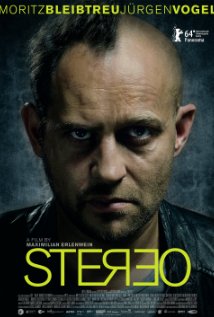
STEREO
Germany, 2014, 98 minutes, Colour.
Juergen Vogel, Moritz Bleibtreu, Petra Schmidt- Schaller, Georg Friedrich.
Directed by Maximillian Erlenwein.
Stereo is a rather mysterious German drama. The initial focus is on Erik, who works in a garage, head shaven, tattoos, riding a motorbike, somewhat suspicious for the audience. However, he is in a happy relationship with a young woman, with her child, and there are scenes of happy outings. Also in the picture is the police officer who holds up Erik initially for speeding and he turns out to be the father of the young woman, initially unsympathetic, but changing as the story progresses.
The mysterious element is provided by the appearance of Henry, a middle-aged man, Moritz Bleibtreu, who seems to be something of a haunting figure, the touch of the devilish, a touch of conscience, bringing up Erik’s past, his connection with gangsters whom he ultimately has to confront. He is haunted by Henry’s presence, no one else seeing Henry, including a psychologist whom he consults.
There is a violent confrontation with the criminals at the end, and audiences left wondering about his future?
1. A German drama, realistic, surreal?
2. The settings, the city, countryside, garage, homes, headquarters of criminals? The musical score?
3. The title, different voices?
4. Erik’s story, his age, appearance, riding the bike, speeding, held up by the police, the discovery that the officer was his girlfriend’s father, his relationship with his girlfriend, child, work in the garage? Happy prospects?
5. The arrival of Henry, mysterious, hooded? Name, presence? Continually with Erik? Shadowing him? Watching him? The conversations?
6. The effect on Erik, nobody else seeing Henry? The psychiatrist and the questions? His girlfriend, her father?
7. Erik’s background, criminal, Keitel and his hold? Meeting with him, the thugs? The discussions about Henry? The criminals themselves, together, Keitel the dominance, the others in defiance? Erik’s reaction?
8. The focus on the family, the girl and her father, the child, the threats?
9. The resolution, Erik’s future?
Published in Movie Reviews
Published in
Movie Reviews
Tagged under
Saturday, 18 September 2021 19:56
Prince, The
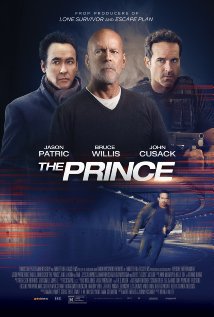
THE PRINCE
US, 2014, 93 minutes, Colour.
Jason Patric, Jessica Lowndes, Gia Mantegna, Bruce Willis, Rain/ Jung Ji Hoon, John Cusack, 50 Cent Jackson, Jonathon Schaech.
Directed by Brian A.Miller.
The Prince seems an overdone title for this gangster thriller.
The audience is immersed in the gangster world, first seeing Omar, Bruce Willis, the gangster chief, suffering the death of his wife and child in a car bombing, swearing revenge on the perpetrator. The perpetrator is Paul, Jason Patric, seen as a mechanic, 20 years later, anonymous and caring for his daughter who is at college.
The main action of the film takes place over a couple of days, Paul concerned about his daughter, trying to track her down, meeting one of her friends, Angela, Jessica Lowndes, who accompanies him on his search, tracking down drug dealers, exercising a kind of violence that alarms Angela.
His back story is revealed, a man who could shoot without mercy, his days on the street, the army, with the gangs, his expertise, his partnership with Sam, John Cusack. His lead to a dealer called The Pharmacy, 50 Cents Jackson, and rescuing his daughter, taking refuge with Sam, but building up to a confrontation with Omar and his men, especially his Asian sidekick, completely ruthless, shooting at whim and will, played by martial arts expert Rain.
The film is constant on action, an extraordinary number of deaths, eliminating a lot of the thugs who act as security and protection for gangster chiefs.
The film has very strong cast in its leads, making it, perhaps, a little more significant than it might have been.
1. Gangster drama, the 1990s, 20 years afterwards? Revenge? Brutality?
2. New Orleans, the atmosphere, in the past, the present, towns in Mississippi? The musical score?
3. Locations: the garage, apartments, New Orleans, grandiose buildings, clubs, drug houses, the streets?
4. Introduction, the flashbacks, Omar, crime lord, farewell to his wife and daughter, the explosion, seeing Paul? His anguish? Promise of revenge?
5. Introduction to Paul, ordinary, his work as a mechanic, as a father, restricting his daughter, studies, the talk on the Skype screen? The phone calls, the strange man answering?
6. Flying to search for her, going to her apartment, and her not being there, the photo with Angela, the name of the club? His searching for Angela, the offhand response? Her wanting something to eat, their talk, her hostility? Criticising him as a restricting father, the rebellion?
7. Information, going to see Ted, the drug supplier? The confrontation, his denials? His uncle, remembering the past, the story of Paul and his shooting so many, not shooting the uncle – and saying that he ran out of ammunition?
8. The fights, Paul being tough, defeating the attackers? Angela and her puzzle? The car chase?
9. Paul, the title, his back story, in the streets, the army, his skill in gaining work, Sam and the partnership, the clashes with Omar? The bomb killing the wife and daughter – the intent for Omar himself? Paul and his escape, disappearance, anonymity for 20 years, not wanting to go to the police?
10. Information about The Pharmacy, going to the drug house, getting in, tough, the women? Finding his daughter, shooting The Pharmacy, so many killings in the drug house? The escape?
11. Sam, different paths, and his prosperity, the house and his men? The reunion, his help, the memories? Paul and his return, the shootouts in Sam’s place?
12. Angela, initially aloof, travelling, involved, the dangers, her helping?
13. Paul going to see his old friend, dead, his son, suspicious, the shotgun, the bag that he had been holding, the ammunition?
14. Omar, his success, his henchmen? The deadly assistant, no scruples in shooting, fighting with Paul? The car chase, the pursuers, Paul killing them,
the henchmen and shooting the messenger, ruthless?
15. Omar and his place, lavish, vengeance, his headquarters, Paul coming in, killing all the guards, the fight with the henchman, his death? Omar holding his daughter, Beth knocking him, Paul shooting him?
16. The success of the film as a thriller, as a presentation of gangster types, immersing the audience in this kind of world?
Published in Movie Reviews
Published in
Movie Reviews
Tagged under
Saturday, 18 September 2021 19:56
Canibal/ Cannibal
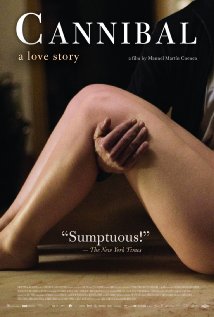
CANIBAL/CANNIBAL
Spain, 2013, 116 minutes, Colour.
Antonio de la Torre, Olimpia Melinte.
Directed by Manual well Martin Cuenco.
Perhaps the title is offputting. But there is much more to the film than indicated by its title.
The Spanish film has won many awards, especially for the actor, Antonio de la Torre. He plays the best tailor in the city of Granada, a reclusive man. However, at the opening of the film, we watch, with him, a car filling up with petrol, then his pursuit of the car, crashing it and taking the body of a dead woman, dissecting it and packing it up in meat parcels for his freezer. We also see him having his dinner, eating the meat from his freezer.
However, this is a portrait of a disturbed man, rather silent and withdrawn, going about his work meticulously, with comments from a seamstress who is a mother figure. Into his apartment block comes a Romanian woman to whom he is attracted, who offers him massage, but whom he kills and dissects. Then her sister arrives, searching for the missing sister, again attractive to the tailor who, this time, supports her, goes to the morgue to identify a body, discusses matters with her, listens to a story about someone pursuing her for money which she has sent home to her parents.
Comfortable and uncomfortable in her company, he invites her to a holiday house on the mountains where he attempts to kill her but cannot. He confesses everything to her, and as they drive back to the city, she grabs the wheel of the car and crashes it, dying.
Carlos is a Catholic and at one stage goes to Mass, the brief sequence showing the consecration and the raising of the host and the chalice with this implication of eating the body of Christ and drinking his blood.
1. The impact of the title? Offputting? Suggestions of a horror story – but the result being a human drama?
2. The city of Granada, the apartments, the more, the tailor shop? The mountain scenery? The musical score?
3. The initial focus on the car, filling up with petrol, Carlos watching, the pursuit, the crashing of the car, the taking of the body, his dissecting it, the meat packages in his freezer? Seeing him eating his dinner, alone? The dramatic and emotional impact of watching him eat?
4. Carlos as middle-aged, tailor, living alone, the comments from the seamstress? His meticulous work, clients, his being obliging?
5. Alexandra, her arrival, interactions with Carlos, is attraction, the massage, her swimming, the death, his dissection?
6. The arrival of her sister, her concern, going to the morgue, not her sister? The discussions with Carlos, her situation, finance, her parents, Bogdan and his pursuit? The discussions, Carlos watching her from the window? His taking down Alexandra’s flyer? His explanation? His consideration, going to the meal, inability to eat the pasta?
7. His love for Nina, invitation to the house, driving, walking in the mountains? The night, putting her on the table, his inability to kill her? His confession the next day, the fact that there had been many killings, the cannibalism? Her puzzle as to why he did not kill her?
8. The drive home, Nina taking the wheel, the crash, the death, his survival?
9. What future?
Published in Movie Reviews
Published in
Movie Reviews
Tagged under
Saturday, 18 September 2021 19:56
Going the Distance
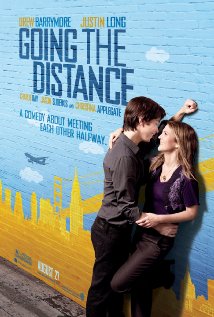
GOING THE DISTANCE
US, 2010, 103 minutes, Colour.
Drew Barrymore, Justin Long, Charlie Day, Jason Sudeikis, Christina Applegate, Ron Livingston, Jim Gavigan.
Directed by Nanette Burstein.
If you go the distance, you may appreciate this 2010 romantic comedy. On the other hand, you may not.
It’s a story of two people in love who are separated (one in New York, the other in Los Angeles) who miss each other, try to keep connected but who fall foul of what happens to so many couples, job opportunities which favour one and disadvantage the other.
So far, so ordinary enough.
The couple is played by Drew Barrymore and Justin Long (who have been together in real life so the relationship is not as realistically far-fetched as might at first appear – as well as testing credibility during the film). One trouble is that Drew Barrymore is such a strong personality, even when acting as hesitant and indecisive, and Justin Long is rather laid-back. When she says she can’t make a decision by herself, we are inclined not to believe her.
The other trouble is the screenplay which has taken a very lazy way out of trying to write characters who have some distinctive personalities by inserting crass language and expressions wearyingly often. It’s not the bodily function jokes (of which there are many), but the constant incidental swearing for no good or realistic reason. Yes, people do talk like this, but that does not make it any less wearying either. The language tends to sabotage the action and the comedy.
Maybe Drew Barrymore’s next romantic comedy will be better.
1. 21st century romantic comedy? Those who founded charming? Those who did not?
2. The San Francisco settings, the New York settings? The business world? Of young adults? Apartments, sharing, workplaces? Going out, bars, restaurants? The musical score and songs? The crass jokes, the wearying crass language?
3. The significance of the basic theme, the possibilities for long-distance relationships? For love? The sex? For commitment?
4. Erin, Drew Barrymore, feisty, the studies, her job, reporting? The authorities? Finishing in New York? The plan to return to San Francisco? Meeting Garrett short-term relationship?, falling in love, possibilities for commitment? The pressure from her sister? Her brother-in-law? Her friends? The nature of the relationship, its continuing over six weeks? The discussions for each of the pair, a possible commitment, despite the distance?
5. Garrett, Justin Long, his work, the record company, the bands, likes and dislikes? The influence of his friends? The chance meeting with Erin, short-term encounter, falling in love, the meetings, his work, remaining in New York City, the long-term relationship?
6. Erin and her sister, her character, protective, controlling, her husband, his comments?
7. Garrett, his friends, the characters, influence, out with them, listening to them?
8. The workplaces, the bosses, jobs and commitments?
9. The crisis, the effect on Erin and Garrett, the resolution – what future?
Published in Movie Reviews
Published in
Movie Reviews
Tagged under
Saturday, 18 September 2021 19:56
I Dream Too Much

I DREAM TOO MUCH
US, 1935, 97 minutes, Black-and-white.
Lily Pons, Henry Fonda, Eric Blore, Osgood Perkins, Lucille Ball, Mischa Auer, Esther Dale, Billy Gilbert.
Directed by John Cromwell.
I Dream Too Much was the introductory film for French singer, Lily Pons, who would come to audition in the United States and was successful, almost immediately, at the Metropolitan in New York City. She was to have a long career as a singer and in opera, but was not so successful in film, making only three features at this time, The Girl from Paris and Hitting a High Note. She did appear in the concert film, Carnegie Hall.
She appeared in opera, entertaining the troops during the war, received the Legion of Honour, sang on radio and appeared in concerts with her husband, then ex-husband, Andre Kostelanetz.
She was not a particularly good actress but entered with a zest into her role in this film, a young Frenchwoman who wants to be an opera star, fell in love with an opera composer, played by Henry Fonda in one of his first three films, all in 1935. He has an unenviable role, drinking, falling in love, marrying, composing, promoting his wife, touches of jealousy, agreeing to her singing training and her success but, touched with jealousy again, drinking, separating – but finally having success, trying to overcome his high-handed pride, with his wife continually devoted – and finally having a success on the London stage with a musical comedy - and a baby.
The story is quite contrived, has music by Jerome Kern with lyrics by Dorothy Fields – but not particularly memorable.
Lily Pons is zestful, able to burst into song, wants to persuade an impresario (played by Osgood Perkins, father of Anthony Perkins) who backs her and reaps the reward of his and her success. She is willing to give everything up for love of her husband, rather more patient with him than he deserved.
Also in the cast is Eric Blore as an eccentric Englishman who entertains with seals – and there are some scenes with a seal. The composer has a part-time job taking tourists around Paris – and one of them is a gumchewing Lucille Ball in an early role. Mischa Auer is the piano accompanist.
The film was directed by John Cromwell who had a long career with a range of films including the 1937 Prisoner of Zenda, Algiers, Abe Lincoln in Illinois, and and the King of Siam.
Published in Movie Reviews
Published in
Movie Reviews
Tagged under
Saturday, 18 September 2021 19:56
Aloha

ALOHA
US, 2015, 105 minutes, Colour.
Bradley Cooper, Emma Stone, Rachel Mc Adams, Bill Murray, John Krasinski, Danny Mc Bride, Alec Baldwin, Bill Camp, Danielle Rose Russell.
Directed Cameron Crowe.
With a title like Aloha, it is obvious that this is going to be a Hawaiian story. But, not quite in the way that might have been anticipated.
This is a film written and directed by Cameron Crowe, a former journalist for Rolling Stone magazine, specialising in popular music – and the film version, somewhat autobiographical, was in Crowe’s film, Almost Famous. Other films by Crowe include his most famous, Jerry Maguire, as well as The Vanilla Sky and Elizabethtown.
Crowe is interested in relationships and these are to the fore in Aloha. However, he includes a more contemporary theme, space exploration – and the exploitation of space for communications as well as for military defence.
The film has a very good cast, led by Bradley Cooper as Frank who has emerged as a significant actor with such films as Limitless, American Heist, The Silver Linings Playbook, American Sniper. The leading lady is Emma Stone, Magic in the Moonlight, Birdman. He plays a scientist with a knowledge of technology and who has served on being wounded in Afghanistan. She plays a captain, a fighter pilot, Allison Ng, who reminds everyone that she is one quarter Hawaiian.
Their paths cross when he is invited to Hawaii by a billionaire entrepreneur, played by Bill Murray, who wants to send up a satellite, privately financed, but in collaboration with the American military, but needs permission from local Polynesians, especially from the King and his kingdom, for a blessing of a bridge and permission for the satellite to go up into the Hawaiian sky.
The personal story is complicated because Frank encounters his girlfriend of 13 years earlier, a woman who was in love with him but whom he stood up. She is Tracy, played by Rachel Mc Adams, who is now married to a rather taciturn pilot, Woody, John Krasinski. The past lovers renew acquaintance, Tracy having the need to vocalise her feelings of the last 13 years, Frank being forced to acknowledge what he did in the past, with Allison witness to this. Tracy has two children, Grace and Mitch, who contribute to the plot complications.
Allison herself has become involved with Frank and believes that his work is to help the entrepreneur put a satellite in space which has nothing to do with military or defence. She experiences some disillusionment with him, but the situation makes emotional and loyalty demands on Frank as to what he really believes in and whom he loves.
And In the background are military officials played by Danny Mc Bride and Bill Camp, liaisons with the general, a crusty character, played by Alec Baldwin.
Cameron Crowe is a liberal at heart and this is the perspective that pervades the final part of the film.
A blend of the light and the serious with attractive Hawaiian and locations and an interesting cast.
1. The story, characters, issues?
2. The locations, Oahu, Honolulu, Waikiki, the countryside, roads, mountains, the Kingdom village?
3. The director, his films, his journalist background, popular music, the range of songs, the score?
4. The title, its use, greeting, meaning? The references to Hawaiian mythologies, the sky, premonitions, burying the dead, divinities? The stories and their effect? Mitch and his interest and books? The response of the US sceptic and rationalist?
5. The film as a romantic story, as a space story, combined themes?
6. The introduction, the history of Hawaii, the 1950s, the 49th state, the media clips?
7. Bradley Cooper, Frank’s story, military background, in Afghanistan, Kabul, his being wounded, the response, the role of Carson Welch, abandoning Frank? The new mission? Frank’s response, coming to Hawaii? His science and technological skills?
8. Frank as a person, his age, experience, his memories, childhood and science, astronomy? His training? Cynical? Motivation for his involvement in the scheme?
9. Allison, pilot, her age, experience, a quarter Hawaiian, brisk, the questions, uniform? Her reaction? Frank and his reticence? The phone call to her mother, describing Frank? Her job, his not wanting to socialise? The plan for the ceremony at the bridge? Travelling with Frank to the Kingdom, meeting the King, the other Polynesians? Her getting the King’s favour, playing the guitar, singing? The effect of being with Frank? The kiss, the relationship? Discovering the truth about Welch, her sense of betrayal?
10. Allison, friendship with Tracy, with the family, helping the children, Grace and the hula, Mitchell and his investigations? Allison as a person?
11. Tracy’s story, her love for Frank, 13 years absence? Her love for Grace, for Mitch? Her love for Woody, marrying him? His work as a pilot, bringing in Frank? The invitation to the house, the meal, and to the club? Tracy wanting to talk about the past? The tension with Woody, his silence? Her decision to leave? Woody leaving? The humorous perspective of Woody and his putting his hand on Frank’s shoulder and Frank interpreting the whole conversation? The later conversation and the subtitles? Woody acknowledging that Grace was Frank’s daughter?
12. Carson Welch and his background, wealth, entrepreneur, the point being made about private enterprise involved in space exploration, satellites? No government control? The military and their decisions? The general, the other assistants? Welch and his patriotism, against the Chinese, the defence of America, Chinese hacking? Weapons in the satellite?
13. Welch as a person, his relationship with Frank, Kabul? At the dance, the dance with Alison? With the authorities? Discussion with Frank?
14. Mitch and his video, Allison seeing it, the bombs, the reaction, the guarantee to the Polynesians that there would be no weapons? The ceremony of the blessing of the gate? The general present?
15. Frank, his decision, Allison’s reaction, the launch of the satellite, the visual detail of its success, the staff and their praise, Welch’s satisfaction? Frank stopping the Chinese hackers? His contact with the technician, advising the satellite to be hit, with the cumulative effect of sound and images, its destruction? Staff reaction? Welch’s reaction?
16. The two assistants, the relationship with Frank, friendship, doing their job, reactions?
17. Welch, his confrontation with Frank, explaining that he would simply build a new satellite?
18. The general’s reaction, believing Welch, criticising Frank, bawling him out? The irony of the exposé of the truth and the general relaxed and congratulating Frank?
19. Welch, on the beach, his arrest?
20. Allison and Frank, together, the bond, love, Frank watching Grace doing the hula, her coming to embrace him?
21. Tracy, the letter from Woody, discussing the past with Frank, her love for Woody, his return, the reconciliation?
22. A satisfying blend of the romantic, with the space theme and American security and technology? An optimistic ending?
Published in Movie Reviews
Published in
Movie Reviews
Tagged under
Saturday, 18 September 2021 19:56
Inside Out/ 2015
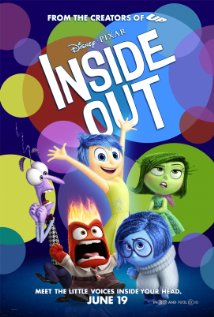
INSIDE OUT
US, 2015, 94 minutes, Colour.
Voices of: Amy Poehler, Phyllis Smith, Bill Hader, Mindy Kaling, Lewis Black, Diane Lane, Rashida Jones, Kyle Mac Lachlan, Frank Oz, John Ratzenberger.
Directed by Pete Docter, Ronaldo del Carmen.
Over the past 15 years or so, the Pixar Studios, now associated with Disney, have stood out as the go-to studio for fine animation films. While they made their mark with the Toy Story series, they had a series of successes, and Oscar wins and nominations, with films like Finding Nemo, The Invincibles, Cars, Ratatouille, Wall-E, Up. Some of their productions have been slighter in recent years, especially Cars 2, but Inside Out should put them up there on top again.
The idea is rather original. What if we went inside the characters heads, identified some of the chief emotions, imagine what they might look like in cartoon form, how they operate in harmony with and in conflict with each other, determining the reactions of the character?In this case it is a young baby, Riley, whom we look out from the outside but then go inside her mind, discovering Joy, the most exuberant and exhilarating emotion.
But then babies cry! The emotion which emerges is Sadness, again a feminine voice, something of a sad sack, low on self-image and esteem, prone to blame herself for making the child unhappy. The screenwriters have decided on three other emotions, Fear (a really nervous type who wants to be over-protective, a male voice), Anger, a squashed looking character, also male, and, Disgust, a somewhat petulant and arrogant female voice.
Each of the emotions has its own special colour. Joy is a bright yellow while Sadness is blue. Disgust is green, while Anger is definitely red!
As Riley grows up, we see each of the emotions influencing the young girl. When her loving parents move house, she gets upset, Joy and Sadness becoming lost, as if on another planet, while Fear, Anger and Disgust are in turmoil within her, even leading her to run away from, and catch a bus, petulant and angry with her parents.
In the meantime, the audience sees that Joy and Sadness are lost, trying to find their way back into Riley’s mind, and accompanied by her invisible childhood friend, Bingbang.
Joy has to come to realise that she just simply can’t eliminate Sadness from every human experience. Sadness is a necessary part of life and, when Joy is able to acknowledge this, trusting Sadness to have her influence, there is a possibility of some kind of recovery and harmony.
Which means that the film is a very nice allegory about human emotions, visualised entertainingly, all at work on a kind of inner computer to try to help the child’s growth but, squabbles arising, envy sometime prevailing, leading to enormous confusion.
The end of the film as well as the initial parts of the final credits are well worth seeing for laugh-aloud responses, seeing the emotions within the minds of Riley’s parents as, faces-painted, they go to support her at a hockey match. One of the funniest scenes is momentarily inside the mind of a very gawky boy who encounters Riley with the emotions running riot in his mind. There is also a school teacher, a frustrated bus driver – and then, the emotions within a dog and within a cat.
Obviously, plenty of room for an imaginative sequel, even a series.
1. The Pixar film, imagination, style?
2. The title, the idea, visualising the in the world, emotions, conflict, dominance, loss, re-gaining, hope?
3. The animation style, the visuals, the characters, the voice cast? Cartoon style, computer-generated? The humans? The emotions? The picture of ordinary life, family life? The mind and the inner computer? The different lands, planets, train of events? Destruction, building? The variety of colours? The musical score?
4. The attraction to Joy, Sadness, Anger, Fear, Disgust?
5. The birth of Riley? Audiences looking on? Her eyes looking out? The experience of joy? The parents, the gradual emergence of Sadness, moments of Fear, elements of disgust, Anger and situations? The memory balls and their storage, colours, the emotions and access?
6. Riley and her childhood, the various incidents, plain, friends, the games, the house? Changing house? Sadness emerging? Life becoming grim, dark? Running away, the dark street, the bus?
7. Joy, her look, bright, cheerful voice, exuberant personality, not wanting Sadness to touch the memories? Interacting with the other emotions? Her becoming lost, lost with Sadness? With Bingbang, the childhood imaginary playmate? Sadness searching? Joy in the dark? With Bingbang, getting the cart, trying to go higher, the energy? Bingbang getting off, Joy’s leap? Her seeing Bingbang, his farewell, his gradually disappearing? The mission to find Sadness? The others in the mind, the confusion, the inner computer not working?
8. Sadness, colour, blue? Downplaying herself, lower self-image, thinking that she spoilt everything, touching the balls and their turning to blue, her being lost, wanting to escape? Meeting up with Joy, Joy allowing the touch, real feelings and tears emerging in Riley, sadness taking over, the catalyst for discovering memories of the truth, her tears, coming to her senses, recovering joy?
9. The comic touch of Fear, ultra-protective? Disgust and being green, suspicious, looking down on others? Anger, rage, red? These emotions as characters, their interactions?
10. Bingbang, childhood friend, helping, disappearing?
11. The return of Joy and Sadness? The emotions in order? Riley talking to her parents, their support of her? The good memories returning, hockey, friends, support? Going to play, her parents and their painting their faces, in the stadium?
12. The final jokes, laugh out loud: the emotions inside the parents, the confusion inside the gawky boy, the teacher trying to cope, the bus driver? The various feelings for the dogs, the cats?
13. A pleasing allegory for children of all ages?
Published in Movie Reviews
Published in
Movie Reviews
Tagged under
Saturday, 18 September 2021 19:56
Hell Below
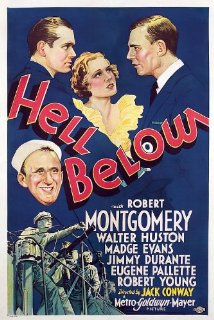
HELL BELOW
US, 1933, 101 minutes, Black and white.
Robert Montgomery, Walter Huston, Madge Evans, Jimmy Durante, Eugene Pallette, Robert Young, Sterling Holloway.
Directed by Jack Conway.
Audiences became used to submarine stories after the 1930s, with the themes becoming even more popular during the 1990s with The Hunt for Red October, K19 The Widowmaker, The Crimson Tide…
This film was released 15 years after the end of World War II and is interesting in its portrayal of submarines, more sophisticated than might have been expected, and life and work in the submarines.
There is a human story on the submarine, a crusty commander played by Walter Huston, an efficient officer who does not always go by the book, Robert Montgomery, and his friend played by Robert Young. On board are a comedy couple with some comic relief, played by Jimmy Durante as Ptomaine the cook and Eugene Pallette as the torpedo supervisor.
There is also romantic story, the Robert Montgomery character encountering a young woman in a raid and bombardment, attracted to her, she to him. But, she has a fiance whose legs are severely injured in a plane incident. She is also the daughter of the commander. This leads to complications with her, wanting to leave her fiance, go with the officer, the disapproval of her father. The officer visits the injured man and decides to do the right thing, even to remaining on the submarine when it is involved in a do-or-die situation, ramming the ramparts at the opening of the harbour to trap enemy shipping and submarines.
Direction is by Jack Conway who began directing films in 1912 and continued to the mid 1940s, working on more high-powered projects at MGM during the 1940s including Boom Town, Honky Tonk and finishing with the Greer Garson comedy, Julian Misbehaves.
1. A submarine story of the 1930s? 15 years after the end of World War I? World War I memories?
2. The Italian setting, atmosphere, the Italian town, the water, submarines, the ocean, ships, blockades? Black-and-white photography? Musical score?
3. The comparative modernness of large submarines, audience interest, the interiors, the dangers, oxygen, blocking off compartments and consequent deaths, the submarines themselves, in the water, submerging?
4. The portrait of the officers and men in the submarines? The commander and his strictness, Tom and Walters, their efficiency, crises and response? The sailors, the comic pair, cook and torpedo supervisor (and their harsh experiences under fire) and the touches of comic relief?
5. The command, collaborating with the Italians, the role of submarines? The damage to the submarine, the attempts to get the oxygen flow going again, the trapping of the sailor behind the door, accepting his death?
6. The consequences for the submarine, the request for it to ram the fortifications, for the men to jump off and be rescued? The acceptance? The manoeuvre, Tom and his remaining on the deck?
7. The human story, Tom and Walters, their friendship, discussions, Walter’s death, Tom’s attitude towards the commander?
8. The commander, strict, by the book and rules? His personality? The revelation that he was Joan’s father? His attitude towards his daughter, her marriage, the separation, her fiance? His severe attitude towards Tom, rebuking him, the hearing, his being stripped of his rank?
9. Tom and Walters, going to the dance, leaving, the encounter with Joan? Tom and the attraction? Her response? Her husband, pilot, his injuries, Tom meeting him at the hospital, meeting Joan? The fiance and his being a decent chap, trying to walk again? His love for Joan?
10. Joan, the attraction, her fear with the bombardment, in love, prepared to leave her husband, the plans to go, Tom and his hard attitude towards her father? His rebuke? Tom going to the hospital, talking with the fiance, the decision about self-sacrifice?
11. On board the submarine, with the commander, the clash, the rebukes, his staying on the submarine, his death?
12. A blend of a film about active service, informing audiences about submarines, and the romantic situation, love, affairs, divorce, fidelity?
Published in Movie Reviews
Published in
Movie Reviews
Tagged under